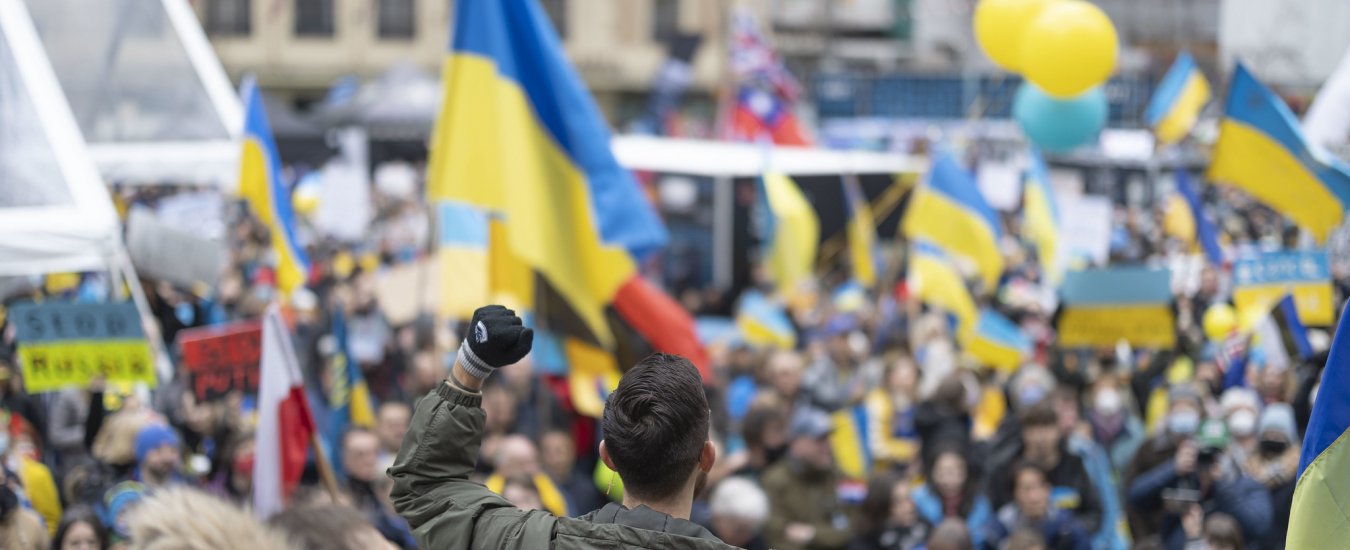Businesses and investors should stay away from the Russian State
The Russian invasion of Ukraine is a grave crime against international law. Investors and businesses will have to make sure that they do not contribute to the Russian State’s coffers as this supports its ability to wage an illegal war and destroy democratic values.
Battle of Values
The international business community cannot exist without the rule of law. International law is built on sovereign rights of states as laid down in the UN Charter, and on human rights law as laid down in the Universal Declaration. The violent attack of Ukraine violates the most basic premise of the international legal order, the inviolability of borders between states. Over the past years, the Russian Government has been increasingly explicit denouncing the core values underpinning international relations. Doing business with such a state is necessarily problematic.
The standards that the international business community has embraced, the UN Guiding Principles and the OECD Guidelines, are based on human rights law. By rejecting these values head-on, the Russian State disqualifies itself as an acceptable business partner. What does this mean for businesses and investors with interests in Russia?
Government Bonds and State Enterprises
As the war in Ukraine is financed by the Russian State, Russian Government bonds are directly linked with systematic and gross crimes against international law. Financial relations with the Russian State has been irresponsible since at least 2014, when Crimea was invaded and the EU instituted an arms embargo on Russia. The Russian occupation of Eastern Ukraine, the war crimes that it committed in Syria, and the violations of human rights of its own population should have been ample reason to exclude the country from any investment portfolio. Financial institutions that still own Russian Government bonds are contributing to grave crimes.
Russian State enterprises are part and parcel of the State’s financial infrastructure. They exercise no leverage over the State and meaningful engagement with them is impossible. Because of the overarching salience and urgency of the violations by the State, all business relations with Russian State enterprises must be immediately terminated.
Other business relationships
Dutch financial institutions also invest in private companies in Russia and Dutch companies have different kinds of partnerships with private enterprises. All business enterprises are expected to conduct human rights due diligence in order to ensure that they do not contribute to human rights violations through their value chains. Risks of involvement in violations of international humanitarian law requires enhanced due diligence. Due to the high level of control that the Russian Government exercises over its economy, many apparently private enterprises are de facto in the service of the State. Therefore, business relations must be ended with enterprises that can be assumed to be controlled by the State or be part of the economic and financial structures on which the State depends. This includes the entire oil, gas and mining sector, the arms industry, and the financial sector, including their suppliers. Regarding other sectors, like agriculture and small and medium sized enterprises, exercise of duty of care is paramount. The Business & Human Rights Resource Centre has analysed how the international business community is carrying out their due diligence obligation in Russia today, and found many serious flaws.
Climate
European countries are heavily dependenton Russian fossil fuels. The aim to reduce this dependency is welcome and long overdue, notably a drastic reduction of the consumption of fossil fuels. Import substitution from other states both defeats the European climate policy and risks enhancing dependency of other states that reject the international value system and repress the rights of their populations.
Research by Profundo shows that ING Bank (2,6 billion dollar), Rabobank (322 million dollar) en ABN Amro (321 million dollar) are deeply involved in financing the Russian fossil fuel sector.
Belarus
Belarus allows Russia to attack Ukraine from its territory and provides essential transportation and other services to the attacking forces. That makes Belarus complicit in the invasion and in war crimes that Russian forces commit. The Belarussian State and its related business community therefore share responsibility for what happens in Ukraine and the application of business principles in Russia does not differ from Belarus.
Opposition in Russia
As indicated by the Investor Alliance for Human Rights in its most recent Investor Alert, investors and businesses can call upon Russian enterprises to speak out against the war and against repression of its employees and other citizens who resist peacefully against the war and repression. The second largest Russian company Lukoil already denounced the war. Investors and businesses that can support their partners in Russian and Belarus should do so. Companies that are active in Ukraine should take any measure they can to protect their employees and those of their business partners, in close consultation with local and international stakeholders.
In Short:
- Investors must immediately end any exposure to Russian Government bonds and to their interests in Russian state enterprisesand exclude these from their portfolios.
- Investors and businesses must end their exposure tot he Russian oil, gas and mining sectors, the weapons industry, and the entire financial sector, as these sectors are essential for the Russian State’s ability to wage an illegal war. Prospects for meaningful engagement are illusional and international standards leave no space to deal responsibly with these sectors.
- The reduction of dependency on the Russian fossil fuels should focus on measures to reduce energy consumption and develop sustainable sources of energy. Substitution by increased imports from other authoritarian states is unsustainable and undermines the international rule of law.
- Investors and companies are called upon to actively seek and use opportunities to support the rule of law and agreed international values in Russia and Belarus.




